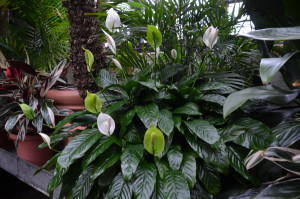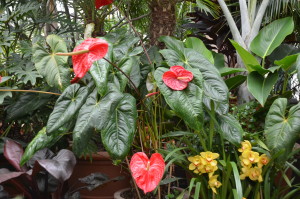Peace Lily (Spathiphyllum) and anthurium are near perfect foliage plants in poorly lit areas around your home or office. They’re native to the tropical rainforests of Central and South America. Both plants are shade-lovers in their native habitats. Direct sunlight for more than one hour will likely burn leaves. They’re members of the aroid (Araceae) family, as are many tropical foliage species.
Leaves are glossy, pointed, and oval or arrowhead-shaped. Their spathe-like flowers are unique and beautiful. White (peace lily) or red (anthurium) flowers emerge from the leaf stalk that gradually fade to green or yellow over many weeks.
Peace lily and anthurium are comfortable at temperatures between 60 – 85 °F. In spring and summer, plant(s) can be moved outdoors provided temperature is above 60 °F. Both thrive in high humidity. Locate near a room humidifier during the dry winter months. Another alternative is to set pots on a tray filled with moist pea gravel and spray plants once or twice daily. Never set a pot directly in water or keep soil (potting media) constantly we as this will promote root rot.
Both species prefer a moist well-drained soil and should be watered weekly with room temperature water. Allow tap water, usually from city fluorinated sources, to stand and dissipate away fluorine or chlorine gas over a 24 hour period before watering. Fertilize monthly during the spring, summer and fall with a water-soluble fertilizer such as Schultz®, Miracle-Gro®, Daniels® or Jacks®. Mix at only one-half the label rate.
Repot plants annually. Remove from pot and divide clumps with a sharp knife. Carefully cut apart plant divisions to include healthy roots and leaves. Clip off spent flowers and old leaves. Pot into a sterile well-drained potting soil.
Monthly inspect the underside of leaves for mites or mealybugs. Problem pests are usually found on the underside of leaves where they’re feeding. Prune off heavily infested leaves and spray insecticidal soap to be rid of insects.



 Posted in
Posted in 
